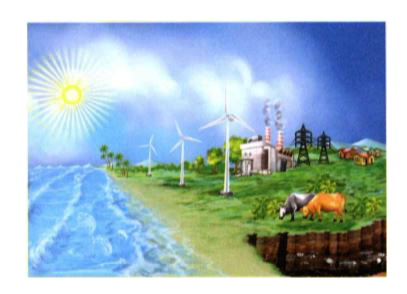We cannot hold a ................... (liquid/gas) in our hand.
To determine whether we can hold a liquid or a gas in our hand, let's analyze the properties of both states of matter step by step.
Step 1: Understanding the States of Matter
- Matter exists in different states, primarily solid, liquid, and gas.
- Each state has distinct properties based on the arrangement and behavior of its particles.
Step 2: Properties of Liquids
- In liquids, particles are closely packed together but can move around each other.
- This allows liquids to take the shape of their container while maintaining a definite volume.
- For example, when you hold water in your hand, it stays in your palm.
Step 3: Properties of Gases
- In gases, particles are much farther apart compared to liquids.
- They move freely and spread out to fill the entire space available to them.
- Because of this, gases do not have a definite shape or volume.
Step 4: Conclusion
- Since liquids can be contained and held in our hands, while gases cannot be held in a specific shape or volume, the correct answer to the statement "We cannot hold a ................... (liquid/gas) in our hand" is gas.
Final Answer
We cannot hold a gas in our hand.
---
- Matter exists in different states, primarily solid, liquid, and gas.
- Each state has distinct properties based on the arrangement and behavior of its particles.
- In liquids, particles are closely packed together but can move around each other.
- This allows liquids to take the shape of their container while maintaining a definite volume.
- For example, when you hold water in your hand, it stays in your palm.
- In gases, particles are much farther apart compared to liquids.
- They move freely and spread out to fill the entire space available to them.
- Because of this, gases do not have a definite shape or volume.
- Since liquids can be contained and held in our hands, while gases cannot be held in a specific shape or volume, the correct answer to the statement "We cannot hold a ................... (liquid/gas) in our hand" is gas.
We cannot hold a gas in our hand.
Topper's Solved these Questions
- MATTERBOOK - ICSECHAPTER - MATTEREXERCISE - Exercises (Section I) Match the following
1 Videos
- MATTERBOOK - ICSECHAPTER - MATTEREXERCISE - Exercises (Section II) Give reasons for the following.
4 Videos
- MATTERBOOK - ICSECHAPTER - MATTEREXERCISE - Exercises (Section I) Write T for True and F for False. Correct the False statements
5 Videos
- MAGNETISMBOOK - ICSECHAPTER - MAGNETISMEXERCISE - Picture Based Questions
12 Videos
- MODEL TEST PAPERS BOOK - ICSECHAPTER - MODEL TEST PAPERS EXERCISE - TEST PAPER II (SECTION II) Numerical questions
2 Videos
Similar Questions
Knowledge Check
The amino acids we cannot synthesize are called ................because we ..........
Aunnecessary, therefore do not need themBlimiting, must include them in our dietCanabolic, must use alternative amino acidsDessential, must include them in our diet
Nitrogen cannot be stored as liquid in sealed containers but ammonia can be, why
View SolutionAlthough we cannot see air, we can . . . . . . . . . . . . . . It.
View SolutionThe compressibility of a liquid is much .......... as compared to that of a gas.
View SolutionChange of a liquid to a gas
View SolutionSolid, liquid, light, gas
View SolutionWhat force, in newton, your muscles need to apply to hold a mass of 5 kg in your hand ? State the assumption.
View SolutionIdentify a solid , a liquid and a gas in the picture given below :
a. Solid :____
b.Liquid:____
c.Gas: ____

View Solution
